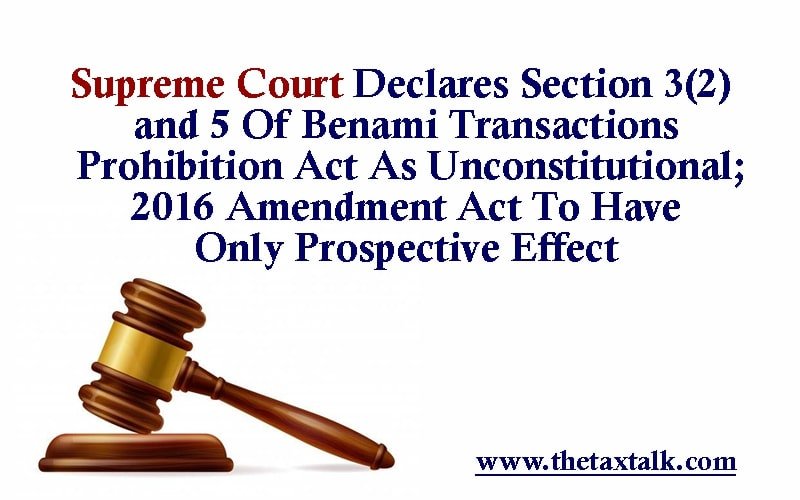![]()
Supreme Court Declares Section 3(2) and 5 Of Benami Transactions Prohibition Act As Unconstitutional; 2016 Amendment Act To Have Only Prospective Effect
Hon SC has ruled in the case of M/s. GANPATI DEALCOM PVT. LTD. (CIVIL APPEAL No. 5783 of 2022), that the authorities cannot initiate or continue criminal prosecution or confiscation proceedings for benami transactions entered into before the 2016 Act came into force, and hence, all such proceedings stand quashed.
Drawing a distinction between the 2016 Act and its predecessor, a three-judge bench of the apex court dismissed the central government’s argument that the 2016 amendment was promulgated merely to fill gaps in the Benami Act, 1988 law.
Hon SC held that the Benami Act, 2016 can apply only prospectively, and struck down sections 3(2) and 5 of the 2016 Act as unconstitutional. While section 3(2) allowed criminal prosecution of those found guilty of acquiring benami properties between 1988 and 2016, section 5 permitted forfeiture of such properties.
Key SC observations:
- Retroactive criminal legislation is prohibited under Article 20(1) of the constitution. The prohibition contained in Article 20(1) is that no person shall be convicted of any offence except for violation of a law in force at the time of the commission of the act. Section 3(2) of the 2016 Act is unconstitutional as it is violative of Article 20(1) of the Constitution.
- Sec 5 has created a confiscation procedure which is distinct from the procedure contemplated under the criminal procedure code or any other enactment. Under the CrPc, confiscation is dependent on the result of the criminal trial. But under the Benami law, there is an implicit recognition of the forfeiture and the officer is mandated to build a case against the accused for such confiscation. So it is not appropriate for the Centre to suggest that property seizure under the Benami prohibition law was a civil action. Rather, the seizure was punitive in nature and, hence, cannot be applied retrospectively.
- The recent PMLA judgement, could be a tool for the arbitrary application of confiscation provisions under the stringent Prevention of Money Laundering Act (PMLA).
- Overall, the 1988 Act was merely a shell, lacking the substance that a criminal legislation requires for being sustained.
Note: 57th and 130th reports of the Law Commission had asserted that it was not “suitable to accept the stringent provisions of Benami Act, 1986, for making benami transactions liable to criminal action”. The commission, the SC noted, had recommended the adoption of certain less stringent, civil alternatives.
Supreme Court Declares Section 3(2) and 5 Of Benami Transactions Prohibition Act As Unconstitutional; 2016 Amendment Act To Have Only Prospective Effect

